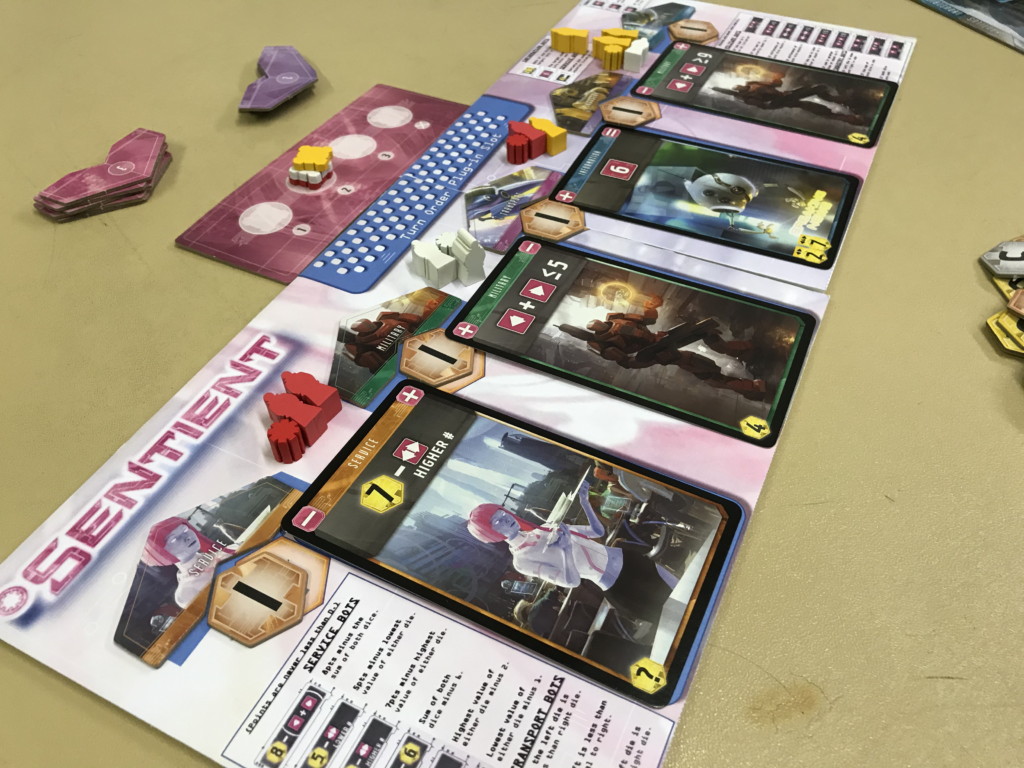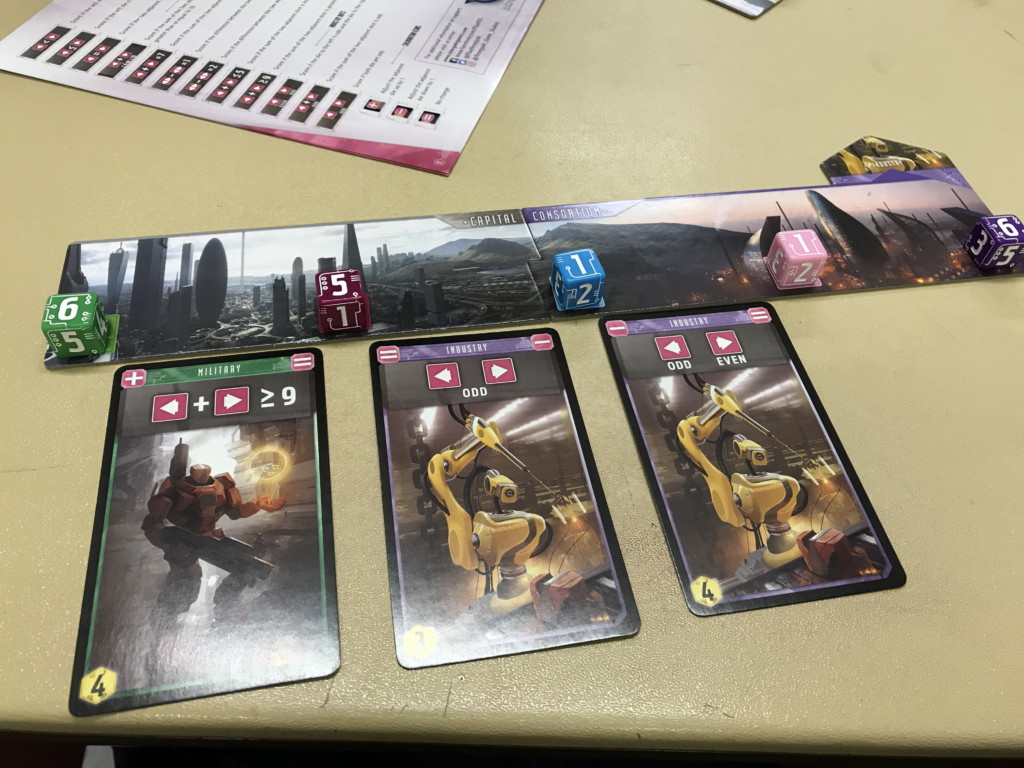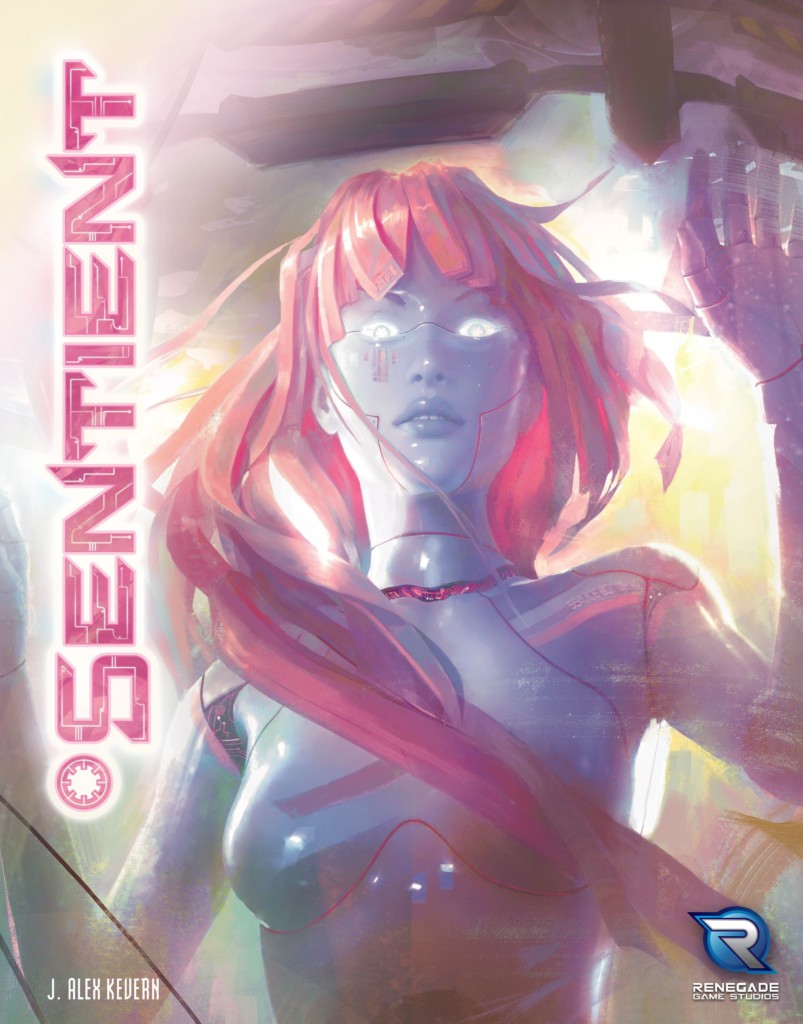Sentient was near the top of my “Fave Games from Origins” list from 2017.
Just 3 years later, I got to play it.
The next great technological revolution is here. Sentient robots for information, transportation, industry — all at our fingertips. Building them is now the easy part. Programming them has proven to be more complicated. A handful of companies have emerged claiming to pull it off, but only one will win out. Your mission is clear: Procure valuable bots and plug them into your network. They’ll have an effect on your systems. Anticipate it correctly, program your bots effectively, and attract the right investors to win and lead the sentient revolution.
Sentient Game Play
To the side, there is a turn order board along with Investor tokens shuffled into their relevant round number.
Players are given 4 people pawns and 5 assistants that are those weird cylinder things with bits bitten out. They also get 5 dice, all D6’s and pretty nice ones to be fair. Players also get a random left and right side of their player board.
Random turn order is done randomly and we’re good to go!
A game is played over 3 rounds each of 5 phases of play.

The main board contains 5 Investor tokens face-up, in-between 4 Bot cards face up. Also in-between the bot cards, and under the Investor tokens is a single victory point coin.
Players roll their dice and place them on the matching colour space of their player board.

Actions
On a players turn, they’ll take one of two actions. Take a Bot, or Pass… So basically one action and one inaction…
To take a bot, the players will place an Agent and any number of their assistants above a Bot card as Influence, they then take that card. The card is then replaced from the deck.
Then you place the bot card between two dice on your player board. The top corners of the card have a plus or minus and these will adjust the value of the associated dice. More on the point of this in a bit.
The Pass inaction does actually have a point and a player MUST pass at least once on their turn. The first thing it does is clear then refill the row of bots. The second thing is to put their other turn order marker on the next round to set up turn order for that round.
Scoring
Once each player has taken 4 cards the round ends and we score… You go through each of your Bot cards to see if you have completed their goal related to the two dice the card in between. For example, it may say if both dice total equal to or less than 9 you score the number of points shown on the card.
Once you have resolved all these you check for control of the new Investor tiles on the main board.

The player with the most influence (Agents + Assistants) each side of that token takes it, the player with the second most takes the point token.
These are added to the player’s board as shown above. After 3 rounds the game ends.
For each set, you score the number of bots times the matching investor tile. So if you have 3 Industry Investor tiles and 3 Industry Bot cards, you score 9. Add all these up plus your VP tokens, most points wins
Theme
I mean… it was an excuse for the art wasn’t it? I really don’t see how it fits in or even matters. You have bots that work for industries I think? That’s fine.
Where does the maths come in? Is that their job? Who are the agents?
Setup
Shuffle and place. The custom board makes that a bit easy but it’s not essential.
Components & Artwork
The art is really nice as is all the iconography. Some of the “maths problems” that don’t use math logic are a little tough to understand at first but once you learn them they’re easy.
The custom dice are really nice. They’re just a D6, but a nice D6.
Ease of Teaching & Accessibility
Everything is open information so that’s a good start. It’s also very simple.
The hardest part is if someone is unable to understand the math but those are open information too so they can be explained.
Sentient Summary
I don’t know many games like this to be fair. Enigma has maths problems and many games let you place influence to draft a card.
So you have to select a robot card. But, the card you select is also part of an area control game to claim investor tokens. Then you have to consider if you are able to score that robot by having the 2 dice on your board solve the problem on the card.
So this is a lot to consider and it’s good fun. It’s especially good when you have a perfect row of bots that all score.
However, you can’t always get the required bot AND increase influence on the required investor tile AND adjust your dice in the correct way AND put that bot in a scorable position.
So most turns you’re just either influencing a random investor or taking a bot you don’t really need and probably can’t score.
Final Thoughts
When I saw this at Origins I thought it looked good but I was worried about replayability. I’m glad I didn’t buy it, the £44 price tag put me off it for sure. I know those custom dice will be most of that cost but really, the game isn’t good enough for that price tag.
However, it would go on the “yeah, I’ll play that again” list, but not too often.
Jesta ThaRogue



Leave a Reply